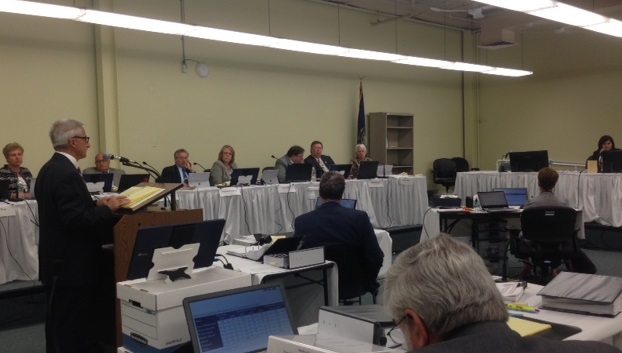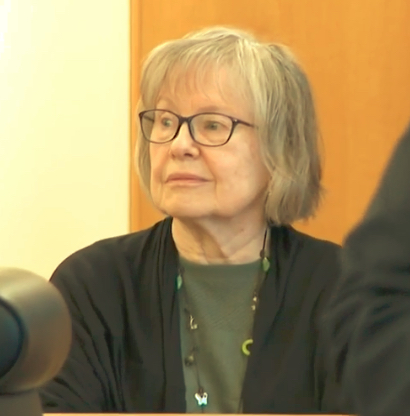CONCORD – Attorney Arthur Cunningham left Thursday’s Northern Pass hearing angry after people were told to leave if they hadn’t signed a confidentiality agreement regarding sealed portions of testimony from Julia Frayer, the project’s economics and project benefits expert.
Frayer, managing director of London Economics, was testifying at about 2:30 p.m. when Martin Honigberg, chairman of the Site Evaluation Committee, asked people who hadn’t signed an agreement to leave so Tom Pappas, an attorney with the Counsel for the Public, could question Frayer about issues that the committee had deemed confidential.
“I get really, really angry about this confidentiality business,” Cunningham said outside the meeting place at 49 Donovan St. in Concord. He refuses to sign a confidentiality agreement on principle, Cunningham said.
InDepthNH.org, the only news outlet covering the afternoon session, was required to leave, but plans to file a right-to-know request for the unredacted transcript of the full day’s testimony.
Cunningham represents intervenors who are building a campground in Stark. Northern Pass has filed an application to build a 192-mile high-voltage transmission project that would run from Pittsburg to Deerfield. The $1.6 billion project would bring 1,090 megawatts of hydro-electricity from Hydro-Quebec through New Hampshire to the New England grid.
Thursday was day 12 of the quasi-judicial hearings before the state Site Evaluation Committee that will decide by Sept. 30 whether to approve or deny the application submitted by Northern Pass Transmission and Eversource Energy. More than a dozen more hearing days are scheduled.
Northern Pass spokesman Martin Murray said redacting portions of a filing is completely sensible.

Julia Frayer, managing director with London Economics.
“The information is proprietary and can be used by competitors. In this case, competitors bidding to provide clean energy into New England,” Murray said. “Common sense will tell you that competitors would love to have access to other projects’ calculations.”
Murray said the Counsel for the Public includes a very substantial and qualified expert staff with full access to all the material and is representing all New Hampshire citizens in the permit process.
Cunningham disagreed. “There is nothing in this docket that should be confidential. These claimed facts from Julia Frayer offered an opinion about substantial savings to New Hampshire customers because of the project and the bulk of her testimony is cloaked in confidentiality. It’s just plain wrong,” said Cunningham.
Cross-examination
Earlier in the day, Frayer sparred with Attorney Pappas over how she reached her conclusions.
In summarizing the back and forth between Pappas and Frayer, Peter Roth, Counsel for the Public, said:
“They believe that introducing this new energy into the Forward Capacity Market will cause the Forward Capacity Market to go down in price and that drop in price gets translated into savings for retail customers around New England and New Hampshire.”
When you take that savings and process it through an economic model, it shows additional jobs will be created and growth in New Hampshire’s Gross Domestic Product, Roth said.
Frayer’s modeling also predicted savings by placing a monetary value on the reduction of carbon emissions, Roth said.
“(Frayer) made a number of assumptions in controlling her models that were questioned by our experts,” Roth said. “Pappas was trying to show those assumptions and controls produce what we could characterize as an unnaturally optimistic perspective about the benefits,” Roth said.
Frayer was very optimistic in her calculations, Roth said. “She didn’t consider any of the down side.” Frayer’s model changed between October and February and her own estimates dropped 25 percent, he said.
Can Northern Pass bid?
Cunningham said 90 percent of Frayer’s projected savings are based on Northern Pass being able to bid into the Forward Capacity Market run by ISO New England. The Forward Capacity Market is in place to make sure there is adequate generating capacity during peak demand times. Generators get paid to maintain capacity even if it may not be used.
“The greatest flaw I saw is that Northern Pass is not a generating facility. It’s a transmission facility so they have no right to bid. That would be up to Hydro-Quebec and they are not a party to the proceedings,” Cunningham said.
Cunningham was further angered at the thought that that same issue may be covered during the confidential portion of Thursday’s hearing.
“What gives Northern Pass the authority to bid into something they no control over,” he said.
Forest Society perspective
Jack Savage of the Society for the Protection of New Hampshire Forests, said during a break that he was stunned to hear Frayer argue that there won’t be any plant retirements as a result of Northern Pass.
“And yet they have been arguing for seven years that they will reduce carbon emissions by retiring other plants that are fossil fuel plants,” Savage said. “It highlights the need to look very carefully at what their claims are based on.”
Northern Pass spokesman Murray countered after the hearing: “Ms. Frayer today testified that she included the anticipated retirement of 500 megawatts of generation, whether Northern Pass is built or not.
“Carbon emissions will be reduced as a result of Northern Pass, because more carbon would be emitted if Northern Pass is not built. That means that Northern Pass brings a more diverse mix of energy into the regional pool; it doesn’t mean that any plants will necessarily be retired as a result of Northern Pass,” Murray said.
Back and forth
Pappas pointed out information in one Frayer report in which she wrote about KRA, the experts hired by Counsel for the Public.
“On the local economic analysis KRA agreed that ‘in general the economic impact analysis by LEI was well-performed,’” Frayer’s report said.
Pappas asked why she didn’t include the full quote from KRA.
It continued, “However the model specification errors resulted in an overstatement of employment impacts during the development and construction phase (by) approximately 20 percent…”
Frayer responded that she believed KRA came up with a flawed conclusion. “They made some pretty silly mistakes,” Frayer said.
She later added, “I intended the reader to use all the words in my report.”
Frayer testified that for materials, the project would spend almost $506.7 million with about 27 percent being spent in New Hampshire.
As to jobs created in the first 10 years, Pappas said her analysis showed more new jobs would be created in Connecticut and Massachusetts than in New Hampshire. And none of those would be created if Northern Pass doesn’t qualify for the Forward Capacity Auction, Pappas said.
Frayer insisted that it would be very unlikely for that to happen.
“On all parameters that I’ve seen, this project should clear and qualify” for Forward Capacity, Frayer said.
Frayer’s updated market analysis shows wholesale electricity market benefits from Northern Pass to average about $600 million for New England annually and $62 million annually for New Hampshire over the study timeframe from 2019 to 2029.
Northern Pass will also create a significant increase in New Hampshire’s Gross Domestic Product estimated at $ 2.2 billion over the construction period and in the first 10 years of operation, according to a Northern Pass fact sheet.
It said 2,600 jobs will be created in New Hampshire during construction and there will be 3.2 metric tons of avoided CO2 emissions per year in New England.
Frayer is expected to continue testifying Friday.
InDepthNH.org’s recent coverage of the Northern Pass hearings. For older stories, see our comprehensive coverage on our Northern Pass page.
April 13, Day 1: Eversource NH Chief Quinlan On The Hot Seat At Northern Pass Hearing
April 14, Day 2: Eversource Chief Questioned About ‘Clean’ Energy Claims And Northern Pass Costs
April 17: Day 3: Eversource: Hydro-Quebec Revenues Could Fall Short In Northern Pass’ First Year
April 18: Day 4: Northern Pass’ Potential Health Concerns Debated At Hearing
April 19: Day 5: Concerns Raised About Northern Pass Affecting Health of Sherburne Woods Residents in Deerfield
April 30: Is NH Getting ‘Hoodwinked’ on Health and Safety By Northern Pass?
May 1: Day 6: Testimony: 44 New Access Roads Needed To Build 192-Mile Northern Pass in NH
May 2: Day 7: Northern Pass Expert: 3 Months of Construction Likely In Downtown Plymouth
May 3: Day 8: Project Official: Northern Pass Construction Limited To 7 am to 7 pm, Noise Assessed Daily
May 3: Eversource’s Chief Quinlan Listed as ‘Host’ For Sununu Fundraiser
May 4: Day 9: Grafton County Attorney Grills Northern Pass Experts On Land Buys
May 5: Day 9, story 2: Common Man’s Alex Ray: Northern Pass Disruption in Plymouth Would Be ‘Fatal’ To Business
May 8: Forest Society Calls Northern Pass Inflated Land Buys a ‘Shell Game’
May 25: Hydro-Quebec Explores Opportunities in New England, New York
May 31: InDepthNH.org, NHPR Talk Northern Pass With John Dankosky
May 31: Day 10: ‘Frac-Out’ Water Pollution Possible When Drilling To Bury Northern Pass
June 1: Day 11 below:
Applicant: Northern Pass Would Mitigate Impact On Endangered State Butterfly




